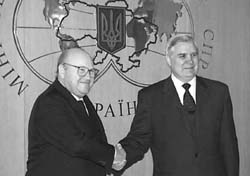Italian minister becomes second to address them to Ukraine

Such short visits of foreign officials to Ukraine seemed to have gone out of fashion, but Italian Foreign Minister Renato Ruggiero stayed in Kyiv not a day or even half a day but only four hours last Monday, which still allowed him to meet President Leonid Kuchma and Foreign Minister Anatoly Zlenko. But whether this allowed him to reach any deals is another question.
“Italy is prepared to help Ukraine move toward Euro-Atlantic integration,” Mr. Ruggiero said. “What we are doing as part of our bilateral cooperation should promote Ukraine’s rapprochement with NATO, the EU, and WTO. And not only rapprochement with but also membership in what we call the Euro-Atlantic community. This ambitious goal requires very strenuous efforts by Ukraine.” It is difficult to suspect Italy of either any great antipathy or affection toward Ukraine. Our states are too far from each other to create any reciprocal problems. Yet, our mutual interests mainly lie in the economic area. The proof of this is that Italy ranks second in Ukraine’s trade and economic turnover with European Union states. During the first nine months of this year, trade turnover between our countries saw a 35% increase over the same period of last year, coming to $948.3 million. As to the political dialogue, it seems to exist, according to Mr. Ruggiero, but not of the kind we have with, say, Russia. After Kyiv, the minister flew on to Moscow, where he spent December 18. This kind of diplomatic gallop often occurred at the dawn of Ukrainian independence, when distinguished foreign guests, en route to Moscow, would drop in for an hour or so to pay the Ukrainian leadership a courtesy call.
Meanwhile, cooperation between Italy and Ukraine is not likely to be confined to new four hour gallops. The Ukrainian-Italian Council for Industrial, Economic, and Financial Cooperation is slated to hold a session in January or February. As Ukrainian Foreign Ministry representative Ihor Dolhov said at the December 18 briefing, this session will extend beyond the limits of economic relations, with the two sides to discuss the protection of Ukrainian workers forced to work illegally in an alien country. There are about 30,000 illegal Ukrainian workers in Italy according to official statistics alone. Mr. Dolhov announced that a number of bilateral documents will be signed at the February session to solve this problem.
Receiving Mr. Ruggiero, the Ukrainian leadership concentrated on three blocks of questions: the development of bilateral relations, cooperation within Euro-Atlantic structures, and international relations as a whole. Mr. Ruggiero’s statement about readiness to support Ukraine’s European integration efforts (including integration into Euro-Atlantic structures) is open to various interpretations. On the one hand, this promise looks like hundreds of others Ukraine has already heard and is bound to hear again and again. On the other hand, as Kyiv has recently gone through the rather hard times of its tapegate, which notably cooled its relationship with the West, and both sides are only beginning to return to a more or less normal attitade. This is why the Italian minister’s statement should be regarded as almost a balm for Ukraine’s wounds. There was even word that the Italian minister specially came to Kyiv to deliver a message from the European Union as a whole.
Indeed, the message was unexpected and pleasant for the Ukrainian top leadership. The joint communiqu О issued at the end of the Italian emissary’s visit to Kyiv says, “Aware of the specifics and European attitudes of Ukraine, Italy will further contribute to the development and expansion of cooperation between Ukraine and the European Union in all spheres stipulated in the Agreement on Partnership and Cooperation and the Joint Strategy of the European Union toward Ukraine, encouraging the Ukrainian Government’s efforts aimed at associate membership.”
Special attention should be paid to the last words about Ukraine’s associate membership. Mr. Ruggiero became the second representative of an EU country in the past few months to uphold this idea pioneered by German Chancellor Gerhard Schroeder, who also approved a new level of cooperation between Kyiv and Brussels during the recent Ukrainian-German consultations. Kyiv is pleased with this. The Ukrainian foreign ministry spokesman concluded with apparent satisfaction, “Such statements mean that Ukraine’s consistent European integration policy is finding support among the EU member states.”
Ukrainian Foreign Minister Anatoly Zlenko also noted that Kyiv would be “grateful to Italy for its possible promotion of our efforts to gain EU associate membership.”






